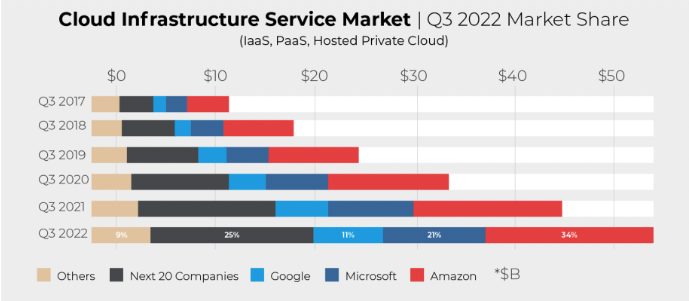*updated in January 2023*
Cloud computing has revolutionized IT in the last decade, with over 94% of enterprises currently leveraging the benefits of cloud computing for some part of their business. Migrating to a cloud environment can improve a business’s reliability, scalability, and cost savings.
To help you understand the current cloud provider landscape and the advantages and disadvantages of each provider, we’ve developed a series of blogs breaking down the top three cloud providers: Amazon Web Services (AWS), Google Cloud Platform (GCP), and Microsoft Azure. This particular blog is focused on the pros and cons of AWS.
Amazon Web Services (AWS) is a leading cloud provider that many Fortune 500 companies rely on to host their infrastructure, and it has a reputation for reliability and scalability. Since its launch in 2006, the company has become known for its wide variety of services, security-focused mindset, infrastructure management, maturity in the market, speed of innovation, and geographic reach.
AWS isn’t meant for every company, and there are advantages and disadvantages to be familiar with when considering it as your cloud provider. Read on to explore the key advantages and disadvantages.
Key Advantages of AWS
The biggest strength of AWS comes from its maturity. Having entered the market before competitors, AWS spent its time building a massive range of feature-rich services. Here are some major advantages of using AWS:
Highly scalable: AWS is known for being highly scalable and flexible. Among its many services, Amazon Elastic Compute Cloud (EC2) is the most popular — it allows users to run their applications on AWS’s virtual machines (VMs). Developers can resize compute capacity in the cloud with minimal friction, quickly boot new server instances, scale capacity to meet requirements, and isolate applications from common failure scenarios.
Supports organizations of all sizes: Organizations of all sizes use Amazon S3 as a cost-effective way to store, protect, and manage their data in virtually any form. Companies that use AWS vary from fast-growing startups and SMBs to large enterprises and government agencies. Their customers include big names like Netflix, Expedia, and Verizon.
Broad geographic coverage: AWS’s global infrastructure reaches 245 countries and territories. With a more extensive network and geographic reach, AWS has the lowest latency in the marketplace and more recently announced plans to add 24 more Availability Zones and eight more AWS Regions.
Maturity in security: AWS invests in customer privacy, data protection, and security. All of the data that flows throughout AWS’s datacenters and regions is automatically encrypted at the physical layer before leaving facilities. Security remains a significant concern since the systems are hosted outside of the organization’s internal boundaries. Customers can encrypt their data, move it, and manage retention at any time from anywhere.
Pioneer in serverless computing: In 2014, AWS pioneered the serverless revolution with its Lamba compute service. This service allows users to run code on virtually any application or back-end service without provisioning or managing their servers. Also known as Function-as-a-Service (FaaS), serverless computing simplifies deploying applications in the cloud by executing, managing, and allocating functions for you. During the AWS re:Invent conference in 2022, Adam Selipsky, CEO of AWS, continued to double down on serverless services to create modern, cloud-native applications.
Key Disadvantages of AWS
While AWS certainly has many proven benefits, it also has a few drawbacks. While planning for cloud adoption or migrating to a new cloud, you must consider the pros and cons of utilizing the service. Here are some of the most significant drawbacks to using AWS:
Resistance to a multi-cloud strategy: Cloud experts claim that AWS focuses less on a multi-cloud strategy because the company cannot profit from licensing as Microsoft can and wants to push customers to a single public cloud strategy.
Less hybrid-cloud friendly: AWS supports hybrid cloud consistency with various hybrid cloud services like Amazon EKS Anywhere. However, enabling multi-cloud solutions isn’t their priority. For organizations that anticipate needing a multi-cloud strategy in the future, AWS might not be the best choice.
Overwhelming choice selection: AWS offers hundreds of highly complex and specialized services, so it can be difficult for smaller businesses to know how to choose which services they need and effectively optimize AWS’s capabilities. Having a plethora of options to choose from can extend migration and adoption times for traditional or smaller enterprises that must hire a third-party team to advise them during the process.
Difficult to determine price: Alongside the large variety of services to consider, customers also find AWS’s pricing complex, making it difficult to optimize costs when managing high-volume workloads.
In Conclusion
Migrating to the cloud and optimizing your workloads can have a tremendous impact on reducing your infrastructure costs, increasing development velocity, and accelerating product development.
AWS is most appropriate if your business needs require broad reach and a deep feature portfolio. AWS has the necessary services to scale up or down quickly for organizations requiring flexibility and scalability. If you have cloud experts on staff or aren’t planning to implement a multi-cloud strategy, then you likely won’t experience any of the potential pitfalls of AWS.
How Wizeline Can Help
Wizeline takes a vendor-agnostic approach to cloud solutions and provides custom cloud strategies for our client’s business and technology needs. We partner with the three industry-leading cloud providers — Amazon Web Services, Google Cloud, and Microsoft Azure — to ensure we have the necessary resources and expertise to make every engagement successful. Download our guide for a full breakdown of each cloud provider.
To learn more about how Wizeline can help you implement or optimize your cloud strategy, please visit our website or contact our team at consulting@wizeline.com to start the conversation.









